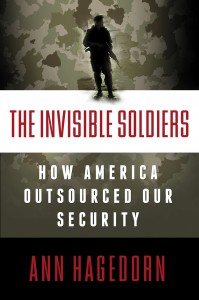Ann Hagedorn’s new book features a chapter titled “What’s All the Fuss About?” in which the author acknowledges that she intends not only to inform her readers about the rise of private military contractors, but also to convince those readers to care. “People hear about this topic and they only know about Blackwater,” Hagedorn says of the firm that gained infamy during the U.S. invasion and occupation of Iraq. “They think we got out of Iraq, and now any concerns over such companies are in the past.”

In The Invisible Soldiers: How America Outsourced Our Security, Hagedorn makes clear that the transformation in the way the nation defends itself is very much ongoing. The book delves into the fascinating—and in many ways worrisome— history of private military and security companies, or PMSCs. These corporations serve increasingly prominent roles, and not just overseas; PMSCs have made inroads into a diverse array of traditionally public responsibilities, from military logistics support to border security and local policing. Hagedorn argues that these companies aren’t inherently evil—“My biggest concern is that I don’t want people to think I’m sensationalizing this,” she says—but she cites a lack of transparency and accountability in an industry that is growing and constantly evolving, often too fast for journalists and elected officials to keep up. On the eve of her book tour, Hagedorn talked with Denison Magazine about the issue and complexities involved in this new industry.
For someone who hasn’t read your book, it may be hard to fathom how significant the issue of a privatized national defense really is. How do you get people to pay attention? Part of the answer is that I put a human face on the components of a rather complex story—for example, I profile a special forces operative in the U.S. Army who gets shot by a U.S. private contractor. And I also introduce my readers to some of the risks involved in depending on private firms for our defense and security.
Someone asked me recently, “Why should we care?” My intellectual response is to talk about democracy, the citizen’s right to know about who defends us. But my gut reaction lately when someone asks me that is, “You wouldn’t be asking that if it weren’t an issue.”
What I mean by that is that we’re living in the midst of a plague of indifference. No one would ask that question—why does it matter, and why should we care?—if there were not indifference regarding the defense of our nation. If somebody else is willing to do it, what does it matter who that is? So for the question, “Why should we care?”—I think the person asking it provides the answer. And I think that such indifference, if you look at history, is in itself a threat to our security.
The answer, essentially, is that people should want to know, and demand to know, who’s being paid to defend their freedom. Yes, that’s right. It’s really about allegiance to one’s nation. The more the citizens of a nation are removed from the job of its defense and don’t see the consequences of engaging in armed conflict, including being told the full number of casualties for private contractors as well as traditional troops, the easier it is for policy makers to engage the nation in conflicts. Privatization of defense allows the government to work under the radar of public scrutiny. Citizens lose a personal connection to the consequences of war.
Even within the traditional armed forces, that’s been an issue for a while—the sense that with a smaller military, very few of us have a direct connection to war and its impact. But your point is that this is different; these entities aren’t even necessarily fighting for their own countries. There’s a reason insurgents often win—they’re passionate. We were insurgents once, in the American Revolution. The outsourcing of defense and security removes citizens from the sense of sacrifice—you are one layer removed from the connection to your nation. Another point here is that drones are a new level of depersonalized warfare and when paired with private contractors, the average citizen is two layers removed from conflict: a machine operated by an employee of a private firm defending the nation. I want readers to wake up to the fact that our country is depending on private military and security companies in a number of areas. We’ve outsourced so much, from intelligence analysis to logistics support to drone operations, diplomatic security, maritime security, border security. I think people need to know that so they can ask questions.
What kinds of questions? Well, if U.S. contractors subcontract, which they do, where do those subcontractors come from? What experience do they have? Who trained them? How were they vetted? There has to be a way to make that transparent. Transparency is one of the biggest issues—especially about the impact of war. When we’re told the number of casualties in the war, MIAs, whatever, we’re not told about private contractors, so we’re not seeing the full impact. In a democracy, we’re supposed to know these things, so we can have a voice about whether or not we want our government to involve us in a conflict or intervention.
The average citizen may feel overwhelmed by the complexity of the privatization issue. It’s our job as journalists to take some of the complicated stuff, some of the information that could fall through the cracks, and make it accessible to the general reader—to give them the facts to make smart decisions. My goal in writing this book is to take a topic that is very big, pull it together through studies, government reports, many interviews, and the work of journalists who’ve gone before me, into a story and trajectory that shows the evolution of an industry. Which is what we’re talking about here, really, a new industry. We need to understand it. Where is it coming from, and where is it going?
It seems safe to assume it’s not going away. That’s what fascinates me. I’m about to leave on a book tour, and before I go on the road, I need to be updated, so I was doing some research, talking to a couple of sources. When I got off the phone, I thought, Gosh, I am never going to lose interest in this topic. I’ll go on to other books, but I’m never going to lose interest, because it’s not possible. This is a topic that shows the monumental, tectonic shifts that we are witnessing globally.
These are shifts in the structure of things—shifts on the scale of the 17th century, when we moved into the era of sovereignty and nation-states. It’s the privatization of defense and security worldwide, and it is happening worldwide—Russia, China, France, Israel, all are developing private military and security businesses. And that development reveals changes in the conduct of war, the growth of the borderless business environment, and by some accounts, the fading of the nation-state. The list is long in terms of what the evolution of this industry shows about our changing world. I just find that utterly fascinating, and as we move forward in this age of globalization, the use of these companies will only expand.
From the outside, the idea of private armies with global reach and no definitive loyalty to a national flag is a terrifying one. Is that concern shared by those on the inside, who actually understand this issue the best? I talked to people who want to literally abolish these companies and believe that’s possible. They’re very concerned about the extension of war, about an era of perpetual war provoked in part by businesses that make money from conflict, and they talk in some of the interviews about how we’re approaching a new Middle Ages—how basically the militarization of the world is going to bring us into a period like the Hundred Years’ War. These are people who are adamant, and I think I represented them well in the book, about the dangers of this, and they have some serious, defensible, easily understood reasons. On the other hand, you have to see how such an industry can be utilized. I’ve shown both sides of the debate.

“This is an industry. We need to deal with it as an industry, holding companies accountable for practices that might not align with our values.”
And you do acknowledge the usefulness of private armies in the book. What are the ways this trend might be a good thing? Not all of these companies are unsavory, scandalous and just plain bad; it’s unsophisticated to look at it that way. If you look throughout history, there are instances where mercenaries help to end conflicts. They have that capability. There’s no doubt that there are good and capable companies that could be considered department stores of defense and security—that are on call in emergencies— so they can be viewed as helpful. Some of these companies provide work for veterans, and that is a very big positive. And maritime security—the shipping industry debated it for a long time, and finally allowed armed security on ships, and all the statistics show it has had a preventive effect on terrorism at sea and piracy.
So that’s true. But what’s also true is, the fact that they exist can influence policy, because they are on call, and because they are so quickly available. Would it have been possible to be involved in both Iraq and Afghanistan to such an extent without private military and security companies? With their logistics support, armed security, and other services, they fill a gap between military commitments and ambitions and the hesitations of nations to call up troops.
That seems to be the real worry—essentially, it’s in these companies’ financial interest to have a more destabilized world. Although we gave these companies a big boost in Iraq and a bonanza of U.S. contracts helped them to become a bona fide industry, we don’t own them. In the book, I refer to them as global wild cards. They can work for any multinational or any nation anywhere in the world. And because of the business they are in and the accountability issues, there is much potential for abuse—hence the need for monitoring and for the awareness of the extent of their presence. There are indeed great potential negatives, until you get the transparency and accountability tied up. This is an industry. We need to deal with it as an industry, holding companies accountable for practices that might not align with our values.
This seems to be connected to the broader trend of privatizing things that Americans have traditionally thought of as municipal, state, or federal responsibilities: prisons, public schools, the list goes on. I saw one report recently that shows private security contractors in the U.S., in general, now outnumber police 2-to-1. So you’re right, it is part of a much larger trend. There was a book that came out about six years ago about all of the once-public services now privatized in this country, and one point the author made was that the most critical part of it was the privatization of defense and security. Even strong advocates of privatization ideologically are not always in favor of privatizing inherently governmental functions of defense and security.
I think one of the most revealing quotes in the book comes from Eric Westropp, a former British army officer, an industry insider, and a strong advocate of international monitoring of the industry. The quote is simply brilliant: “There’s always the seed [of mercenaries], and the Iraqi conflict watered it, big time. Now we have a new crop that will spread globally. Many years from now it may have to be stopped, but for now it will be used and must be closely monitored. Anyone taking a close look will tell you that.”
About Ann Hagedorn
Hagedorn is an award-winning author of five narrative nonfiction books: Wild Ride, Ransom, Beyond the River, Savage Peace, and now The Invisible Soldiers. She has been a staff writer for The Wall Street Journal, the New York Daily News, and the San Jose Mercury News. She holds an M.S. in journalism from Columbia University, an M.S. in information science from the University of Michigan, and an honorary doctorate in humane letters from Denison University, where she majored in history as an undergraduate. She has taught adjunct courses in narrative nonfiction writing at Columbia University’s Graduate School of Journalism, Northwestern University’s Medill School of Journalism, Miami University, and Xavier University. She divides her time between New York City and a small Ohio River town that became her home during the research for her third book.

How do you acknowledge the ideological—and thus political—implications of this issue? It’s a nonpartisan account, though anyone can use it for their own political crusade for or against the industry. I tried to be as fair as possible to the industry and recognize the fact that these are companies,and companies do what companies do. They identify markets and then find a way to make a profit. I don’t take a stand for them or against them. They may have passed through the portal of permanence or there may be a movement someday to abolish them. But for now, they must be visible and closely monitored. People need to know that they exist, that there’s more out there than Blackwater.
What was your personal takeaway from having spent so much time digging into this issue? I imagine it would be easy to be pessimistic. I’m a total optimist, actually. I’m also a great believer in my country and especially in the resilience of Americans—I love my country, and I love the idea and the practice of democracy, despite how immensely messy it can be.
It’s just that to keep a democracy, you have to practice it. It’s not a given. It’s not something you can take for granted. And the way you practice democracy is to be informed. Our job as journalists is to be servants to the citizens of our nation, to provide the facts and the truth so that there is discourse on the crucial issues, debate, even protest. So no, I’m not pessimistic. I don’t think about dark futures. As long as I see evidence that democracy is alive and well in this nation, then I can remain an optimist.
From an author’s perspective, how did the writing and reporting compare to your previous books? It’s the hardest book I’ve ever written. The topic is so vast, it’s constantly changing, and even the industry itself has been a challenge to define as it embraces such a vast array of services. What were the origins, the turning points, the major players? When was the term “private military company” introduced, and who came up with it and why: to distance the business from the image of unsavory exploits of mercenaries? When did public relations and lobbying step into the private military business? All of that had to be unearthed. It wasn’t like doing a historical narrative, as I have before, where you do research in archives and read previous and established analyses. This was a moving-target topic, always evolving—that’s part of the nature of the business. It’s ongoing, somewhat hidden, and really needs to be understood. I write with two audiences in mind: One is the general public now, of course; the other is future historians, who will hopefully use my work to better understand this incredibly complex, unnerving, and intriguing time of change we are now living through.
Ryan Jones is a senior editor at The Penn Stater Magazine and the former editor of SLAM Magazine. He is the author of King James: Believe the Hype—The LeBron James Story.
 About Ann Hagedorn
About Ann Hagedorn
Hagedorn is an award-winning author of five narrative nonfiction books: Wild Ride, Ransom, Beyond the River, Savage Peace, and now The Invisible Soldiers. She has been a staff writer for The Wall Street Journal, the New York Daily News, and the San Jose Mercury News. She holds an M.S. in journalism from Columbia University, an M.S. in information science from the University of Michigan, and an honorary doctorate in humane letters from Denison University, where she majored in history as an undergraduate. She has taught adjunct courses in narrative nonfiction writing at Columbia University’s Graduate School of Journalism, Northwestern University’s Medill School of Journalism, Miami University, and Xavier University. She divides her time between New York City and a small Ohio River town that became her home during the research for her third book.
The Invisible Soldiers: In Review
When Ann Hagedorn set out to explore private military and security companies (PMSCs), those rapidly multiplying businesses, she was seeking elusive truth. She seems not to have encountered a lot of transparency, the popular word that captures our longing for more honesty in public life. To write The Invisible Soldiers: How America Outsourced Our Security (Simon and Schuster, 2014) required considerable investigative skill and great courage.
Hagedorn’s investigative skills were already apparent in 1971, when as a student at Denison, she wrote an essay about the Harlem Renaissance after finding neglected sources in Yale University’s Beinecke Rare Book and Manuscript Library. She went on to work as a librarian at the University of Kansas before she turned to investigative reporting, focusing especially on corruption in the world of finance. She wrote for The Wall Street Journal in the years when it was publishing much of the best investigative writing in the U.S.
When Hagedorn left newspaper reporting to write books, she began with Wild Ride (1995), a riveting tale of the corruption and fall of Kentucky’s Calumet Farm. Then she wrote Ransom (1999), a prescient look at the international kidnapping that continues to grow in our time. Beyond the River (2004) is the story of John Rankin and the Underground Railroad in Ohio. Like Savage Peace (2007), her brilliant biography of the year 1919, The Invisible Soldiers is in part a meditation on the terrible costs of making war.
Politicians and other journalists have not ignored military privatization. When Blackwater military contractors killed 17 Iraqi civilians and injured 20 more in 2007, the attack led to five investigations and the renaming of Blackwater to “Xe Services” and then to “Academi,” which continues to be one of the most powerful and profitable of many PMSCs. But there seems to be a growing consensus that we’ve always had mercenaries, and it’s no big deal. Hagedorn provides much evidence to the contrary.
Her research for Ransom gave Hagedorn access to information about the large British influence on military privatization. And she uncovered a barely visible shift, beginning in 2012, “from the traditional military to a mix of Special Forces and private military and security companies that together would provide the backbone of national security and defense.” She explores the likely influence on foreign policy of our growing dependence on drones. The Association of Unmanned Vehicle Systems International (AUVSI), for example, is a lobbying group for drones that had 7,000 members by 2011, when they were already pushing hard for self-regulation and pro-industry legislation. As Congress seeks to understand and control our increasing dependence on a privatized military, the lobbying is likely to be relentless, and unless we are very careful, profitability will figure into our deliberations about making war.
Hagedorn shows how the political influence and potential for corruption by PMSCs increase every day, and her account of this dangerous growth in The Invisible Soldiers should stir up an international debate.
—William Nichols, Emeritus Professor of English

